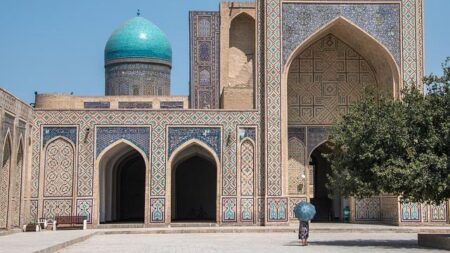In the wake of unprecedented challenges posed by the COVID-19 pandemic, Africa stands at a pivotal crossroads, seeking innovative avenues for recovery and growth. Conventional sectors have been deeply impacted, prompting the urgent need for fresh strategies that can drive economic resilience and social revitalization. In this context, the convergence of sports and creative industries emerges as a promising frontier.This article delves into the transformative potential of these vibrant sectors, exploring how they can serve as catalysts for lasting development across the continent. Drawing insights from a recent report by the Brookings Institution, we analyze how investment in sports and the arts can not only bolster economic prospects but also foster community cohesion and individual empowerment. As Africa charts it’s path forward,the exploration of these game-changing industries may hold the key to unlocking a new era of prosperity and innovation.
Exploring the Role of Sports in Economic Revitalization Across Africa

The intersection between sports and economic revitalization in Africa is becoming increasingly significant as nations seek sustainable pathways to recovery. Sports not only foster a sense of community and national pride but also create ample economic opportunities. the development of local sports leagues and infrastructure can lead to job creation, tourism, and enhanced international visibility. investment in sports has been shown to yield multiplier effects,where the initial investment stimulates investments in adjacent sectors such as hospitality,retail,and transport. By harnessing the passion for sports, African nations can stimulate growth in various local economies while also investing in the health and well-being of their citizens.
To better understand the economic impact of sports, consider the following benefits that have been documented across the continent:
| Benefit | Description |
|---|---|
| Job Creation | New opportunities in coaching, administration, and facility management. |
| Tourism Boost | Increased visitors for local and international sporting events. |
| Infrastructure Development | Improved transportation and facilities that also serve the public. |
| Youth Engagement | Programs that keep youth engaged and away from negative influences. |
In addition to conventional sports, creative industries related to sports, such as merchandising and digital content creation, play a vital role in economic recovery. These industries can be leveraged to enhance brand visibility and attract sponsorships, leading to an influx of capital that can fund local initiatives. As African nations invest strategically in both sports and creative sectors, they have the potential not only to stimulate economic growth but also to cultivate an empowered workforce ready to innovate and compete on a global scale.
Harnessing Creative Industries for Sustainable Growth in African Economies

The conversion of African economies requires innovative approaches, and the creative industries, especially sports, offer a pathway to sustainable growth. By leveraging local talents and cultural heritage, these sectors can contribute significantly to job creation, promote tourism, and stimulate broader economic activities. The infusion of creativity into traditional sectors can lead to the development of unique products and services that resonate with both local and global markets, fostering a more diversified economic landscape. Key areas to explore include:
- Cultural Exports: Facilitating the global reach of African art,music,and fashion.
- Sports Development: Investing in infrastructure and talent nurturing to create vibrant sports leagues.
- Digital innovation: Utilizing technology to enhance creative expressions and business models.
- Community Engagement: Encouraging grassroots participation in the creative sectors to bolster local economies.
Moreover, the integration of sports and creative industries can serve as a catalyst for youth empowerment, engaging young people in productive activities that promote national pride and cohesion. By fostering partnerships between governments, private industries, and educational institutions, African nations can build ecosystems that support creative entrepreneurship. A targeted approach to policy-making and investment in this arena can definitely help maximize advantages, as seen in the following table showcasing prosperous models across the continent:
| Model | Country | Impact |
|---|---|---|
| Film Industry Training | Nigeria | Job creation and increased global interest in Nollywood. |
| Sports scholarships | South Africa | Enhanced educational opportunities through athletics. |
| Art Festivals | Kenya | Boosted tourism and cultural exchange. |
Case Studies of Successful Sports Initiatives Transforming Communities

Across Africa, numerous sports initiatives are making a profound impact on community development, illustrating how sports can unify and empower populations. Organizations like streetfootballworld leverage the power of soccer to engage youth in structured programs. Through various community projects, they focus on teaching important life skills and offering mentorship. This approach not only fosters athletic talent but also emphasizes education, employment, and social inclusion. Local tournaments serve as platforms for showcasing young athletesŌĆÖ skills while attracting support from local businesses, effectively creating a cycle of positive influence that strengthens communities.
Another exemplary initiative is Teach A Man To Fish, which employs sports as a medium to teach entrepreneurial skills to young people. Their “Business in a Box” program integrates sports coaching with financial and business training, transforming participants into community leaders. This model encourages self-sufficiency and cultivates a culture of entrepreneurship among the youth. With participants running their own sports-based businesses and community events, they not only contribute to the local economy but also inspire others to follow suit. The transformative impact of these initiatives is evidenced by the growing number of local businesses and improved community cohesion that stem from sports.
innovative Policies to Strengthen the Intersection of Sports and Creativity

The intersection of sports and creativity offers vast opportunities for economic growth and social transformation in Africa. Innovative policies designed to bridge these two domains can unleash new avenues for youth engagement, community development, and sustainable livelihoods. By fostering collaborations between creative industries and sports organizations,governments can amplify the impact of both sectors. Key strategies might include:
- Incentives for Cross-Disciplinary Partnerships: Establish tax breaks or grants that encourage collaboration between sports clubs and artists, enhancing cultural programming at sporting events.
- Funding Creative Sports Initiatives: Promote projects that integrate art into sports experiences, such as community murals in stadiums or interactive installations during major events.
- Training and Capacity building: Develop workshops that blend sports management with creative industries education, preparing individuals for diverse career paths.
Moreover, understanding the local context is vital for policy effectiveness. A focused approach can definitely help tailor programs that resonate with the community,leading to enhanced participation and investment. Implementing mechanisms to track the impact of these innovations on both sports and creative sectors could provide data to guide future policies. Suggested metrics include:
| Metric | Description |
|---|---|
| Participation Rates | Measure the growth of engagement in sports and creative events following policy implementation. |
| Economic Contribution | assess the financial impact of joint initiatives on local economies. |
| Community Satisfaction | Gather qualitative data on community perceptions towards integrated programs. |
promoting Investment in Sports and Arts to Drive Employment and Development

investment in sports and the arts emerges as a pivotal strategy to stimulate employment and foster economic development across Africa. By channeling funds into these sectors, governments and private entities can create numerous job opportunities, boost local economies, and inspire community engagement. Sports initiatives not only promote health but also generate ancillary economic activities, including tourism, infrastructure development, and enhanced visibility for businesses. Similarly, the creative industries, encompassing music, film, and visual arts, can significantly enhance cultural tourism, providing a platform for african talent to shine on the global stage.
Strategically promoting these sectors requires a multifaceted approach, including:
- Public-Private Partnerships: Encouraging collaborations between government agencies and private investors to fund sports facilities and arts programs.
- Education and Training: Implementing vocational training to equip individuals with necessary skills, fostering talent and creativity.
- marketing and Promotion: Leveraging digital platforms to promote events and showcase African talent to global audiences.
To visualize the impact, consider the following:
| Sector | Potential Job Creation | Economic Impact |
|---|---|---|
| Sports | 500,000+ Jobs (per year) | $2 Billion Boost to GDP |
| Creative Industries | 300,000+ Jobs (per year) | $1.5 Billion Boost to GDP |
Through targeted investment strategies and collaborative efforts, Africa can harness the transformative power of sports and the arts, redefining its development landscape and generating sustainable employment opportunities for its youth.
Engaging Youth: Building a Future Through Sports and Creative Opportunities

In the wake of economic challenges, harnessing the potential of youth through sports and creative avenues can serve as a pivotal strategy for revitalizing communities across Africa. By investing in local sports programs and creative initiatives, we can unlock the innate talents of young people, enabling them to contribute positively to society. These platforms not only foster individual skills but also cultivate teamwork, discipline, and leadership among participants. Funding and support for grassroots movements can lead to a vibrant ecosystem of sporting events, arts festivals, and cultural exchanges that not only engage youth but also attract international attention and investment.
Moreover, collaborations between governments, NGOs, and private sectors can amplify these efforts. Stakeholders can create comprehensive programs that intertwine sports and arts, providing comprehensive training that prepares youth for careers in various sectors, including entertainment, sports management, and the creative economy. Consider the following benefits of integrating sports and creative industries in youth engagement strategies:
| Benefits | Impact on Youth |
|---|---|
| skill Development | Enhances personal and professional competencies |
| Community Unity | Fosters a sense of belonging and collaboration |
| Economic Opportunities | Creates pathways to employment and entrepreneurship |
| Cultural Expression | Promotes identity and pride through artistic mediums |
In Summary
as Africa navigates the complex landscape of recovery in the wake of economic and social challenges, the potential of sports and creative industries emerges as a beacon of hope. these sectors not only possess the capacity to drive economic growth and job creation but also foster social cohesion and cultural exchange. By investing in and leveraging these dynamic industries, African nations can unlock innovative solutions that resonate with their unique contexts and aspirations.
The insights presented in the Brookings Institution report underscore the importance of viewing sports and creative sectors not just as entertainment but as vital catalysts for transformation. Policymakers, stakeholders, and communities must collaborate to harness the enthusiasm and talent within these fields and align them with broader development goals.
As the continent strives for resilience and sustainability, embracing the transformative power of sports and the arts could prove to be a game changer.With the right support and vision, these sectors can play a pivotal role in shaping a prosperous future for Africa, turning challenges into opportunities and dreams into realities. The time for action is now,and the momentum for change is gathering.







